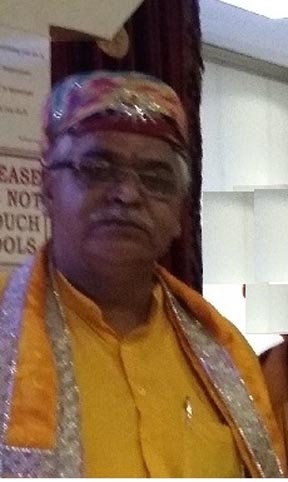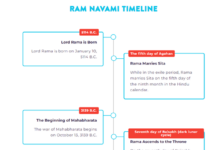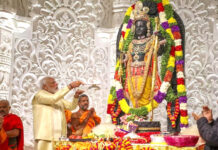
The term prayer is derived from the Latin word precari which means ask earnestly or beg or entreat. In that sense, a prayer is an invocation or act that seeks to activate a rapport with an object of worship through a deliberate communication.
In Sanskrit, the word Prarthana means prayer or seeking. The word has a deep religious connotation. Hindu philosophy says that prayer is one of the methods of being in communication with God. For a Hindu, it is a form of religious practice performed either individually or collectively and takes place in public or in private.
It may take the form of a hymn, chant, formal creedal statement, or a spontaneous utterance from the praying person or involves the use of words, bhajans, songs, or complete silence. People pray for many reasons such as personal benefit or for the welfare of others. Sometimes, sacred prayers are held for the well-being of a particular community or country or world in general.
Prayers are usually used to address the God, or spirit, or deceased person, or Lordly ideas with the purpose of petitioning, praising, worshipping, confessing transgressions (sins), pouring out one’s emotions, thoughts, or requesting guidance or assistance or even complaining to the chosen deity. The main objective of a prayer across all religions and cultures is seeking solace, relief from this worldly life, and peace.
Among Hindus, prayer forms an important component of life. Every action, event, any ensuing circumstances, success or failure is filled with prayers. In Hindu culture, there are different and numerous prayers, worships, rituals and ceremonies compared to other cultures. They involve whole spectrum of life from dawn to dusk but the objective or motive of the prayers remains the same. To name some: Hindus pray while waking up, going to bed, bathing, eating meals, starting studies, traveling, having birth, naming a child, performing marriage, funeral, taking medicine and commencing a new venture.
Prarthana is not merely requesting or praising or confessing or complaining for any particular thing but communicating with God. Hindu prayers can be broadly classified into four types. Firstly, Mental or Manasa Prarthana that refers to staying in the deep thought of the Divine. That is, making an appeal or expressing desire to God though at lower level but completely forgetting oneself. In our daily life, it also refers to keeping in mind or thoughts our ancestors and asking them for their blessings.
2) Verbal or Vacha Prarthana denotes chanting of mantras, verses or verbal appeals and requests for our progress and welfare. In this Prarthana several mystical syllables are used since these syllables have the power of conveying the Grace of God quicker and also cleansing the aspirant both physically and mentally.
3) Physical or Karmana Prarthana signifies offering of oblation to fire, making mystical gestures, circumambulation/ Pradakshina of a temple, prostrating/Sashthanga Namskar in front of god, lighting and waving the lamps, offering food to god, going on a pilgrimage, etc. In our daily life, this includes respecting and helping our living elders, teachers, and Gurus and seeking their guidance and blessings for our progress and protection.
4) Prayer of others’ welfare or Sarvahit Prarthana is the most remarkable prayer of all the prayers. Every Hindu sings this universal shloka every day. It indicates that the best gift anyone can give to humanity is pray for the welfare of all the living creatures in the world and let them live peaceful and quiet lives in divinity and religiousness. This act pleases our Lord who wants us acknowledge the ultimate truth-“Let all beings live in happiness.” The Hindu Universal mantra from the Upanishad says:
Om, Sarve bhavantu sukhina?
Sarve santu niramaya?
Sarve bhadra?i pasyantu
Ma kashchit du?kha bhagbhavet
O? Shanti?, Shanti?, Shanti?
The meaning of this mantra:
May all be prosperous and happy
May all be free from illness
May all see what is spiritually uplifting
May no one suffer
Om peace, peace, peace
Hindu prayers are not only made to God or Deity and the images representing them, but also to many holy and sacred manifestations of the Ultimate such as sages, saints, preceptors, ancestors, elders and teachers, the mountains, the rivers, stones, animals, birds, and even the trees.
There are set of prayers that a Hindu sings every day spiritualizing and energizing one’s every day existence. There are prayers that are chanted on certain occasions. And there are some prayers that are meant for special occasions.
Prayer is the vehicle for daily dialog with the One who created us and worship Him with great reverence and obey His wishes. Daily prayer is important for several reasons as it gives us an opportunity to share all aspects of our lives with God and express our gratitude for the things He provides. It also provides us a platform for confessing our sin and asking for help in overcoming that sin and acknowledge the God who is really in control of our lives.
Prayer makes a difference. Adverse circumstances change when people pray. Due to prayers, diseases are sometimes healed, strength is imparted, guidance is given, hearts are softened, needs are met. When anyone honestly prays for others it helps them we earn their blessings obtain happiness for doing so.
So, do daily prayers for your and others welfare. When you pray, you transcend your body and mind and become a part of the cosmos. Chanting prayers daily helps you to get lots of benefits and good qualities.
They help to suppress one’s ego, pride, ignorance, arrogance, wrath, vanity and become a friendly, kind, considerate, compassionate person, and gain mental stability, will-power, and discipline in life.
Pt Anil Joshi






